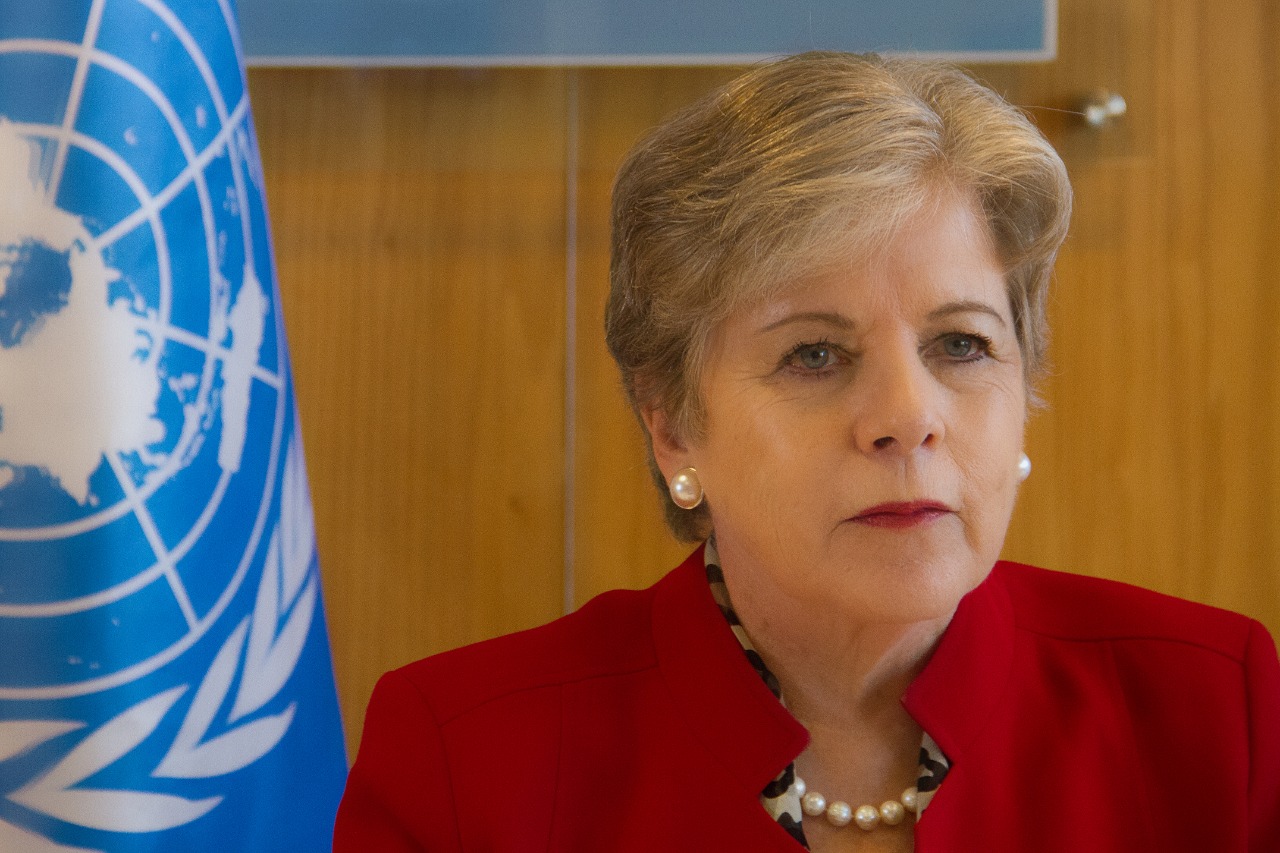ECLAC’s Executive Secretary Highlights Joint Work with the OECD to Support the Sustainable Development of Latin American and Caribbean Countries
Work area(s)
During the celebration of the 5th anniversary of the OECD Programme for the region, Alicia Bárcena reaffirmed the importance of addressing current challenges with renewed partnerships and international cooperation based on common interests.

The Executive Secretary of the Economic Commission for Latin America and the Caribbean (ECLAC), Alicia Bárcena, highlighted the fruitful joint work carried out with the Organisation for Economic Co-operation and Development (OECD) in support of the sustainable development of the region’s countries, during the 5th anniversary of the OECD’s Regional Programme for Latin America and the Caribbean.
The High-Level Public Session of the Steering Group of the Programme (LACRP) took place virtually this Friday with the presence of Heads of State and authorities from numerous countries in the region, including Carlos Alvarado, President of Costa Rica; Marta Lucía Ramírez, Vice President and Minister of Foreign Affairs of Colombia; Josep Borrell, High Representative and Vice-President of the European Commission; Félix Ulloa, Vice President of El Salvador; Juan Orlando Hernández, President of Honduras; Ministers and Deputy Ministers of Foreign Affairs and of the Economy from Brazil, Canada, Chile, Germany, Guatemala, Mexico, Panama, Paraguay, Peru, Portugal and the United Kingdom; along with representatives from the main multilateral and regional organizations related to Latin America and the Caribbean.
In a recorded message transmitted during the celebration, Alicia Bárcena paid special tribute to Ángel Gurría, the OECD’s outgoing Secretary-General – who leaves his post on May 31 – and highlighted the emphasis given to Latin America and the Caribbean under his tenure. She also sent greetings and best wishes to Mathias Cormann, Australia’s former Finance Minister, who will succeed Gurría at the head of the organization as of June 1.
“For ECLAC, it has been an honor working hand-in-hand with the OECD, being partners through different initiatives such as policy dialogues, data collection, analysis and reports, including with the Office of the Secretary-General, different thematic Directorates – including the Global Relations Directorate – and the OECD Development Centre,” she indicated.
ECLAC’s Executive Secretary noted that the international economy is undergoing a period of major transformations, where climate change, migration, the technological revolution, increasing trade disputes and health are just some of the examples. “The world faces old and new challenges, and this calls for new compromises, agreements and policies,” she declared.
In this sense, she recalled that the 2030 Agenda and its 17 Sustainable Development Goals (SDGs) call for a paradigm shift from the prevailing development patterns and existing culture of privilege towards a new model that prioritizes sustainability and equality. “This global agenda requires actions and policies geared towards inclusive growth, the elimination of poverty and sustainable patterns of production and consumption, integrating the economic, social and environmental spheres,” she explained.
Alicia Bárcena emphasized that the COVID-19 pandemic has brought new challenges and made clear the importance of working together and strengthening support for the countries of Latin America and the Caribbean to foster institutional settings, the building of financial capacities, and to develop social and technological capabilities. “These are key issues to build up more resilient and inclusive societies,” she indicated.
She added that Latin America and the Caribbean is a development in transition region that faces numerous challenges: it has an undiversified production structure characterized by low productivity and a lack of technological upgrading, which has been hard hit by the pandemic with the closure of 2.7 million Small and Medium-sized Enterprises (SMEs) and major impacts on employment (it is estimated that 47 million jobs were lost).
The region has also seen increases in poverty and inequality, despite the social gains made in the last decade. “We have estimated that in 2020 the total number of poor people rose to 209 million, 22 million more people than the year before, while the average Gini index (which measures inequality) likely increased by 5.6% versus 2019,” she indicated.
In addition, Latin America – and the Caribbean in particular – are very vulnerable to climate change and have already experienced its negative effects. Furthermore, the region has limited taxation capacity and its lack of progressive tax structures continues to be a concern.
“Addressing local and global challenges requires more than ever a comprehensive and renewed approach to partnerships, a new international cooperation perspective based on common interests, shared values and strong complementarities. These are the common interests and values that we share with the OECD,” ECLAC’s Executive Secretary concluded in her message.
Type
Country(ies)
- Latin America and the Caribbean
Contact
Public Information Unit
- prensa@cepal.org
- (56 2) 2210 2040